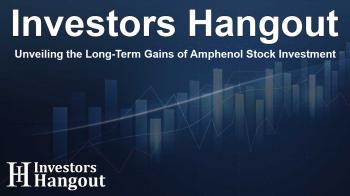Unveiling the Long-Term Gains of Amphenol Stock Investment

Understanding the Investment Journey with Amphenol
Amphenol (NYSE: APH) is a company that's seen remarkable growth and stability in the investment world over the years. With an impressive market capitalization currently at $146.49 billion, Amphenol's stock has outperformed many other options available to investors, recording a notable annualized return of 21.52% over the past 20 years. This has put Amphenol ahead of the market by a significant 12.82%.
The Compounding Power of Your Investment
Imagine this: if an individual were to invest $100 in Amphenol stock two decades ago, that investment would have ballooned to an astonishing $4,733.14 today. This impressive figure is based on the stock price which was approximately $119.98 at the time of this writing. Such results underline the power of compounded returns – a concept that illustrates how earnings on an investment generate their own future earnings.
Amphenol's Stock Performance Snapshot
Over the last 20 years, Amphenol has demonstrated consistent performance, building confidence among shareholders and attracting new investors. The company’s ability to adapt to market changes and maintain robust financial health sets it apart within the electronics sector, hinting at a sustainable future in the tech world.
Investment Insights for New Investors
For those considering entering the market, understanding how companies like Amphenol can alter one's financial landscape is crucial. The reality is, long-term investments typically yield better returns as opposed to short-term trades. Investors often find that the stock market rewards patience and strategy; observing how Amphenol has grown serves as a perfect example of this mind-set.
Final Thoughts on Investing in Amphenol
In summary, the journey of investing in Amphenol stock has proven to be financially rewarding for many individuals. Its consistent growth metrics present a solid case for potential investors looking for stability and long-term growth. The key takeaway remains clear: the market can be unpredictable, but companies with proven performance records like Amphenol are often safer bets for sustained returns.
Frequently Asked Questions
What is Amphenol's current market capitalization?
Amphenol currently holds a market capitalization of approximately $146.49 billion.
How much would an investment of $100 in Amphenol stock be worth today?
An investment of $100 made 20 years ago would be worth about $4,733.14 today.
What is the average annual return for Amphenol stock?
Amphenol stock has recorded an average annual return of 21.52% over the last 20 years.
How has Amphenol outperformed the market?
Amphenol has outpaced the market by 12.82% on an annualized basis over the past two decades.
Why is compounding important in investing?
Compounding helps investors grow their wealth exponentially over time, as earnings generate additional earnings, significantly increasing the total investment value.
About The Author
Contact Ryan Hughes privately here. Or send an email with ATTN: Ryan Hughes as the subject to contact@investorshangout.com.
About Investors Hangout
Investors Hangout is a leading online stock forum for financial discussion and learning, offering a wide range of free tools and resources. It draws in traders of all levels, who exchange market knowledge, investigate trading tactics, and keep an eye on industry developments in real time. Featuring financial articles, stock message boards, quotes, charts, company profiles, and live news updates. Through cooperative learning and a wealth of informational resources, it helps users from novices creating their first portfolios to experts honing their techniques. Join Investors Hangout today: https://investorshangout.com/
The content of this article is based on factual, publicly available information and does not represent legal, financial, or investment advice. Investors Hangout does not offer financial advice, and the author is not a licensed financial advisor. Consult a qualified advisor before making any financial or investment decisions based on this article. This article should not be considered advice to purchase, sell, or hold any securities or other investments. If any of the material provided here is inaccurate, please contact us for corrections.

